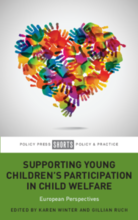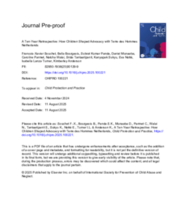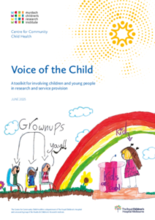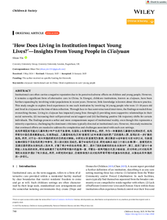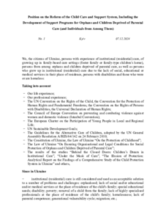Displaying 11 - 20 of 375
This Policy and Practice Short has emerged from an Erasmus+ Key Action 2 project funded by the European Union (EU). The project has become known as the PANDA project, an acronym drawn from the words participation and collaboration for action, and its focus is on promoting the participation rights of young children, aged 12 and under in child welfare and child protection.
This article presents an in-depth analysis of children and young people's engagement in Terre des Hommes Netherlands (TdH NL) influencing work over the past 10 years. It underscores the importance of integrating children's voices into decision-making processes to ensure systemic change and the sustainable protection of children's rights.
This study explores how caseworkers in Australia’s out-of-home care system balance children’s right to participate in decisions with concerns about risk and trauma. Findings show that while participation is valued, caseworkers often limit or delay it due to fears of destabilizing placements or harming children’s wellbeing, highlighting the need for more reflexive approaches to strengthen participatory practice.
A randomized controlled trial examined the effectiveness of a peer grief support program for youth in foster care, an underrepresented population who experience disenfranchised grief.
This study reanalyzes interviews with 20 children in Ireland to explore their perspectives on participation in child protection processes involving their families. Findings show that while children often shared adult concerns, they viewed participation differently—particularly regarding risk, safety, stigma, and the need for ongoing dialogue—highlighting the importance of more child-centred approaches in practice.
The Voice of the Child toolkit is an evidence-based resource designed for researchers, service providers, clinicians, and others keen to involve children and young people in their work – whether they are just starting out or looking to expand their skills. Drawing on research, consultations, and best practice, this toolkit offers practical guidance for planning, designing, and implementing a process of involvement – whatever your context.
Vlad is a 13-year-old child rights advocate in the Republic of Moldova. Speaking at a United Nations Human Rights Council's debate on the rights of the child on 13 March 2025, he stressed the importance of investing in early childhood development. "The earlier we act, the more chances we give the child to develop harmoniously," he said.
This study explored the experiences of 14 adolescents living in a ci'aiyuan childcare institution in Xiangxi, China, finding that it sometimes fostered supportive relationships, enhanced perceived social support, and facilitated positive life changes. While these accounts challenge dominant negative views of institutional care, the study emphasizes the need to address ongoing complexities and challenges in such settings.
In Ukraine, for the first time, individuals who have experienced institutional care, as well as those who have experience with family-based care, have united and agreed upon a common position regarding the reform of the child care and support system, including the development of programs to support orphaned children and children deprived of parental care.
Practitioners explain the core value of children's right to participate in the process of transitioning.

